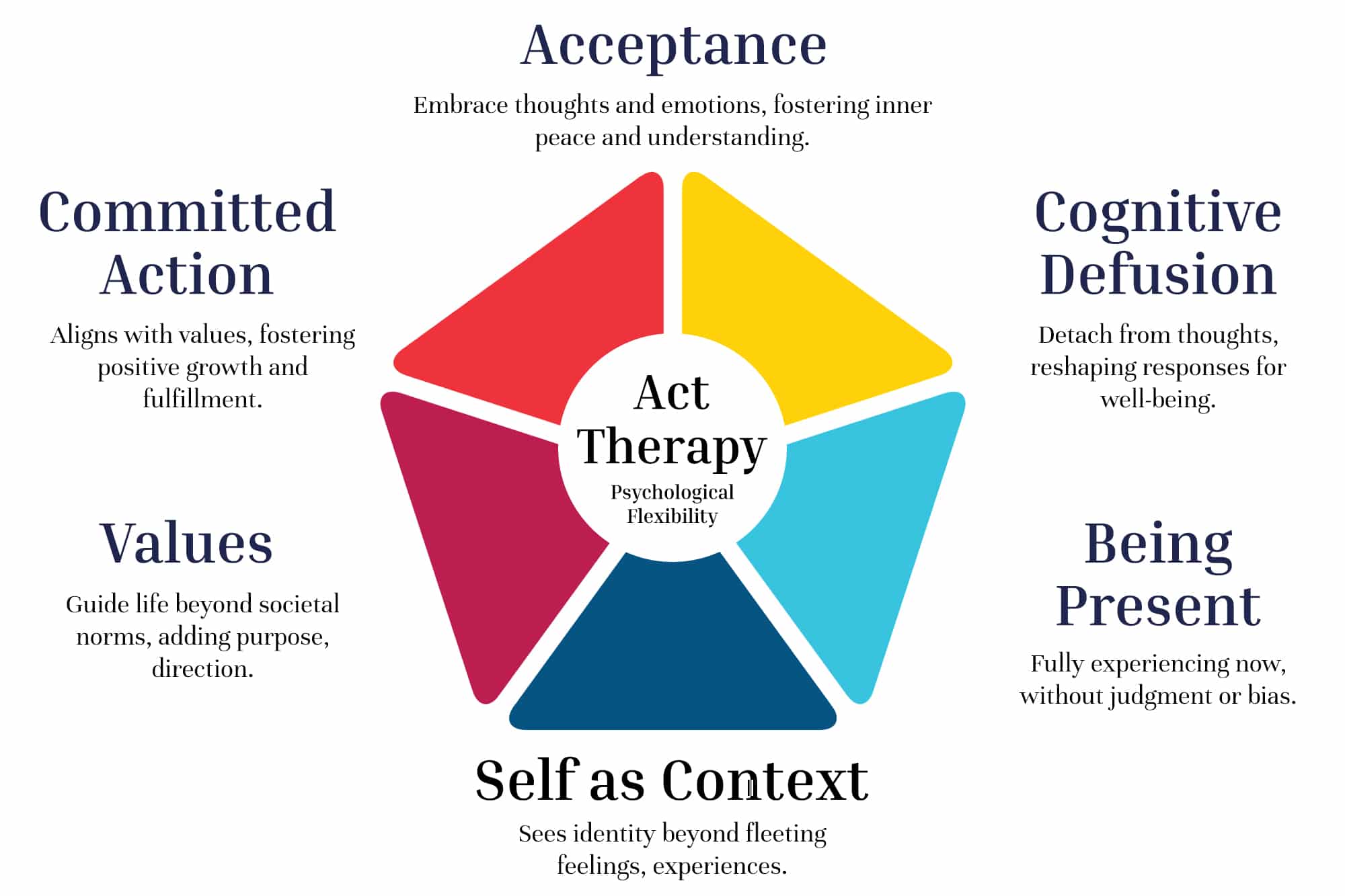Table of Contents
What is Acceptance and Commitment Therapy?
Acceptance and commitment therapy (ACT) is a proactive form of psychotherapy rooted in traditional behavior and cognitive behavioral therapies. Instead of resisting or denying their inner emotions, clients are taught to embrace them, recognizing them as valid responses to specific situations. This acceptance doesn’t hinder them from progressing in life. The goal is for clients to acknowledge their struggles, then commit to behavioral changes, irrespective of their current circumstances or feelings.
ACT Therapy, introduced in the 1980s by psychologist Steven C. Hayes from the University of Nevada, was inspired by Hayes’s personal journey. His own battles with panic attacks led him to a pivotal decision: to fully accept himself and his experiences.
ACT therapists work with the belief that fostering acceptance can enhance psychological flexibility. This method offers numerous advantages, potentially helping individuals break the cycle of routinely avoiding certain thoughts or feelings, which can otherwise escalate into bigger issues.
What to Expect in ACT Therapy
In the initial ACT therapy sessions, therapists prioritize clarifying a client’s values. Later sessions concentrate on assisting clients in connecting with and integrating these values into their daily lives.
Here’s a glimpse of a standard ACT therapy session looks like:
- Reflecting on the past week to pinpoint and commend behaviors that aligned with the client’s values.
- Discussing actions that didn’t match those values and delving into the obstacles that influenced such decisions.
- Employing the six core ACT techniques to navigate these challenges, ensuring the individual aligns more with their values in subsequent situations.
Throughout Acceptance and Commitment Therapy, the therapist assists you in adapting these principles to your own experiences. This may involve teaching you acceptance techniques, cognitive defusion methods, or guiding you to distinguish your core self from transient thoughts and emotions.
Mindfulness exercises might also be introduced during sessions. These promote a balanced and non-judgmental awareness of previously evaded thoughts, emotions, or memories.
Your therapist will also pinpoint instances where your choices deviated from your core values, guiding you towards behaviors more in tune with them.
Additionally, your therapist might suggest specific tasks to practice outside of sessions, like mindfulness or cognitive exercises, or tasks to clarify your values. These assignments, co-decided by you and your therapist, can be adapted to be as relevant and effective for you as possible.
What Does Acceptance and Commitment Therapy Help With?
ACT Therapy in Chattanooga, TN can help treat many mental and physical conditions. These include:
Anxiety Disorders
Anxiety disorders often manifest as persistent, excessive fears or worries in situations that aren’t necessarily threatening. ACT Therapy assists individuals with anxiety by helping them recognize and accept these feelings rather than combat or avoid them. By understanding their anxiety triggers and reactions, individuals can move towards a more value-driven life, even with the presence of anxiety.
Depression
Depression can create feelings of sadness, hopelessness, or a lack of interest in previously enjoyed activities. Through Acceptance and Commitment Therapy, individuals are taught to detach from negative self-talk and depressive ruminations. They’re encouraged to engage in activities aligned with their values, which can bring about a sense of purpose and fulfillment.
Obsessive-Compulsive Disorder (OCD)
OCD is characterized by unwanted repetitive thoughts (obsessions) and behaviors (compulsions). ACT aids those with OCD by teaching them to accept these obsessive thoughts without feeling compelled to act on them. By viewing thoughts as transient and not definitive of one’s self, the hold of OCD can be lessened.
Psychosis
For those experiencing psychosis, distinguishing between reality and their perceptions can be challenging. ACT Therapy helps these individuals acknowledge their experiences without immediate judgment, teaching them to ground themselves in the present moment, reducing the impact of hallucinations or delusions.
Eating Disorders
Eating disorders often arise from a complex mix of emotional, psychological, and societal pressures. ACT helps individuals understand and accept their body image concerns, recognizing the societal pressures contributing to these feelings. With this acceptance, individuals can move towards healthier eating behaviors that resonate with their intrinsic values.
Substance Use Disorders
ACT works with those struggling with substance use by helping them recognize the underlying feelings and experiences that may contribute to their usage. By focusing on their core values and long-term goals, individuals are better equipped to make choices that steer them away from substance use.
Workplace Stress
In today’s fast-paced work environment, many face significant stress and burnout. Acceptance and Commitment Therapy assists employees in recognizing and accepting these feelings of overwhelm. By reconnecting with their values, individuals can make work-related decisions that promote well-being and job satisfaction.
Chronic Pain
Living with chronic pain can be mentally and physically draining. ACT doesn’t aim to remove the pain but helps individuals live with it. By accepting the pain and recognizing it as just one aspect of their life, individuals can engage in activities that align with their values, ensuring a fulfilling life despite the pain.
ACT Therapy Techniques
ACT, unlike Cognitive Behavioral Therapy (CBT), doesn’t primarily aim to lessen the occurrence or intensity of distressing thoughts, emotions, or impulses. Instead, the focus is on easing the effort to regulate or remove these experiences and enhancing one’s engagement in activities that resonate with their personal values.
In ACT Therapy, the objective is to foster psychological flexibility, which is the liberty to decide our actions, independent of what we might be feeling or thinking internally. The six processes that guide this approach in ACT therapy are as follows:
1. Acceptance
Acceptance is about wholeheartedly recognizing and welcoming all facets of your thoughts and emotions. Instead of resisting, dismissing, or trying to modify them, it encourages a genuine embrace. By doing so, individuals often find more peace and understanding regarding their inner experiences, even if those experiences are challenging.
2. Cognitive Defusion
Cognitive defusion is the art of detaching oneself from overwhelming thoughts and feelings, thus reshaping how one responds to them. This can lessen their adverse impacts on one’s well-being. Practical techniques encompass neutrally observing thoughts without prejudgment, vocalizing the thought as if it’s a song lyric, and pinpointing the spontaneous reactions that specific thoughts evoke. This approach can free individuals from being excessively entangled with their negative thoughts.
3. Being Present
To be present means to immerse oneself fully in the current moment. It’s about keenly observing thoughts and feelings without the impulse to judge or alter them. When one truly experiences life’s events without any filters or biases, it lays a foundation for authentic behavioral evolution and a richer, more genuine life experience.
4. Self as Context
The ‘Self as Context’ philosophy deepens the understanding of selfhood and identity. It promotes the viewpoint that individuals are an amalgamation of much more than just their immediate thoughts, emotions, and life events. In essence, it’s about realizing the vastness and depth of one’s identity beyond transient feelings and experiences.
5. Values
Exploring values means pinpointing personal guiding principles across various life spheres and ardently working to embody them. This perspective contrasts sharply with actions that arise purely from wanting to sidestep discomfort or from merely aligning with societal norms and expectations. Living by genuine personal values can infuse life with purpose and direction.
6. Committed Action
Embracing committed action is all about purposefully integrating changes that resonate deeply with one’s core values, ushering in positive transformations. This journey may weave through pathways like setting tangible and meaningful goals, confronting and understanding challenging emotions or past traumas, and cultivating essential life skills that empower individuals to lead more fulfilled lives.
Benefits of Acceptance and Commitment Therapy in Chattanooga, TN
A foundational strength of acceptance and commitment therapy is how it nurtures psychological flexibility. This means being attuned to one’s thoughts and emotions, welcoming them when they’re beneficial, and letting go when they aren’t. This skill encourages individuals to react with intention and mindfulness to their feelings and thoughts, steering clear of impulsive behaviors and prioritizing actions that resonate with a purposeful life.
Another key benefit of ACT therapy is its ability to foster profound self-awareness and nurture a compassionate outlook towards oneself. A significant aspect of ACT is its role in guiding individuals to reshape their relationship with their internal thoughts and emotions. This process helps them navigate their experiences with greater understanding and empathy.
How ACT Therapy Helps With Addiction Treatment
At the heart of many substance abuse issues and addictions is an individual’s struggle to manage negative thoughts and emotions, both mentally and physically. ACT works by enhancing the psychological flexibility of those battling substance use disorders. This increased adaptability empowers individuals to face discomfort and pain without resorting to harmful escapes, like getting high or drunk.
While alcohol and drugs might seem like an immediate solution to suppress unsettling emotions and thoughts, they only lead to further troubles in the long run. Not only do they intensify negative emotions and thoughts, but they also bring about new challenges, especially when continuously used as a temporary relief. ACT offers methods that equip those with substance use disorders to handle uncomfortable emotions and experiences, such as the strong desire to use or intense cravings. These techniques prove invaluable during the rehabilitation process, providing individuals with the resilience to prevent relapses and continue their journey to recovery even after completing treatment.
How Effective Is ACT Therapy?
Emerging research indicates that ACT stands as a promising and effective treatment that healthcare professionals can integrate into the broader scope of medical and mental healthcare. Notably, ACT has been linked to enhancements in:
- Mental Well-being: Individuals undergoing ACT often experience significant improvements in their psychological state.
- Medical and Behavioral Outcomes: ACT has shown to positively influence specific medical results and encourage healthier behaviors.
- Functional Improvements: Those engaging with ACT typically report an enhanced ability to function daily.
- Life Quality: Overall, many attest to an enriched quality of life after undergoing ACT.
The American Psychological Association not only corroborates ACT’s effectiveness for psychosis and obsessive-compulsive disorder but also advocates for its efficacy in treating depression, mixed anxiety disorders, and chronic pain.
Begin Your Acceptance and Commitment Therapy in Chattanooga, TN Today
If you’re prepared to embrace your past, live in the present, and envision a mindful future, we’re here for you. At Iris Wellness Group, we offer the transformative experience of ACT Therapy in Chattanooga, TN as a key component of your holistic treatment journey.
Learn how we can help you create a path to real and lasting sobriety. Contact us online or give us a call at 423-564-6114.














